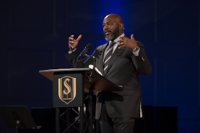Derek Hicks lectures on North American Christianity
January 19, 2017

 Derek Hicks, assistant professor of religion and culture at Wake Forest University in Winston-Salem, North Carolina, was the 2014 Page Lecture guest speaker at Southeastern Baptist Theological Seminary (SEBTS) on Nov. 4 and 5.
Derek Hicks, assistant professor of religion and culture at Wake Forest University in Winston-Salem, North Carolina, was the 2014 Page Lecture guest speaker at Southeastern Baptist Theological Seminary (SEBTS) on Nov. 4 and 5.
The Page Lectures bring outstanding theologians to campus each fall to deliver two lectures on a subject of concern to the Christian community.
Hicks researches and teaches in the area of African-American religion. He is the author of “Reclaiming Spirit in the Black Faith Tradition” and is also a contributor to several other works.
His first lecture was titled “A Reclaiming Past: Considering the Historical ‘Others’ in the North American Christian Tradition.”
Hicks presented two statements from others that were influential on his Christian faith: “my faith is stronger today in the loss of my first son than it ever has been” and “you seem smart, why are you a Christian?”
“My faith perspective was a bit deeper than I had initially given it credit,” Hicks said. “It was more complex and messier than what I had initially thought. This ultimately caused me to ask several questions of my own.”
He explored the reality of why so many African-Americans chose to convert to Christianity throughout history of hardship.
The faith that Hicks’ forefathers possessed impacted his life. He was raised in the church and baptized at the age of seven.
Oral traditions passed down by his grandmother were especially influential. “She knew firsthand how faith in God would overcome anything,” he said. “African-Americans have articulated … a reclaiming spirit, a spirit that governs the nature of their Christian expression for those who have had to endure this world as the others.”
He believes that African-Americans had a posture of seeking something good out of the bad. They “sanitized a soiled form of Christianity so they might be transformed, so they might be seen new creatures not simply in terms of sin nature but also as whole people in God’s sight,” Hicks added.
Hicks pointed out that “by cleaning up Christianity, they were able to draw upon its cleansing properties to present their lives anew.”
“Cleansed, healed and empowered by the blood,” he emphasized. “The resulting nature of this faith tradition gives hope to the others and is articulated in the words of Jesus himself, the one who is most worthy to be emulated in African-American tradition.”
“Black faith has traditionally been an active expression, a liberating posture, one that takes this Christ-event and makes it live, alive in these experiences through what I call reclamation,” he said.
In the following lecture, entitled, “The Gumbo Pot: Theological Education as a Complex Brew,” Hicks focused on how these topics relate to academics.
The two questions Hicks highlighted were “why study African American Christianity?” and “but were they saved?”
He used the metaphor of a “melting pot” and Gumbo stew. Hicks states that there is one “folk” represented in a melting pot.
“I am more of a Gumbo man,” Hicks explained. “This is not a neat or tidy dish, thus it is not a melting pot. Gumbo is a complex brew of flavors oddly coming together to form an exquisite experience of taste. Gumbo is cultural to be sure. … It exhibits colorful expressions of a given community. Gumbo binds a community and it is tied to a general posture of fellowship and cooperation.”
Hicks also stated that a lack of contact and fellowship in a community will lead to fear and hatred among people. He supports a view of Christ that calls Christians to have a moral responsibility to embrace inclusion and selflessness.
Hicks called for theological education to promote deliberate dialogue concerning diversity and to recruit and retain diverse faculty, students and staff. Theological education should also alter structures to help those from underrepresented backgrounds and to strengthen preparation in the classroom for global citizenship.
Hicks sought for the audience to see the value of diversity. “A melting pot is not inherently a bad thing,” he said. “I just prefer the flavors, the distinctiveness and the complexity that comes with the Gumbo pot. If not for the Gumbo pot I would not have some enduring friendships both on the right and left that catapulted me to where I am today.”
To watch these lectures online, please click here.
To view photos from chapel, please click here.